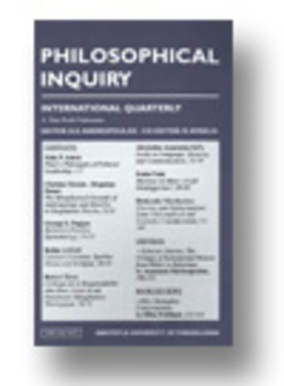The Confusion of Logical Types in Plato's Parmenides
Part of : Philosophical inquiry ; Vol.40, No.1-2, 2016, pages 13-29
Issue:
Pages:
13-29
Author:
Abstract:
No abstract (available).
Subject:
Subject (LC):
References (1):
- L.T.F. GAMUT, Logic, Language, and Meaning; vol.11: Intensional Logic and Logical Grammar, (Chicago: The University of Chicago Press, 1991.)G. Ryle, "Plato's Parmenides," Mind, 48, No. 190 (1939), pp. 129-151; "Plato's Parmenides II," Μ/κ/48, No. 191 (1939), pp. 302-325.T. Scaltsas, "A Necessary Falsehood in the Third Man Argument: Dedicated to the Memory of Gregory Vlastos," Phronesis 37, No. 2 (1992), pp. 216-232.G. Vlastos, "The Third Man Argument in the Parmenides," Philosophical Review 63 (1954), pp. 319-349;" Addenda to the TMA : A Reply to Professor Sellars," Philosophical Review 64 (1955), pp. 438-48;"Postscript to the TMA: A Reply to Mr. Geach," Philosophical Review 65 (1956), pp. 83-94;"Addendum ( 1963)," in Studies in Plato's Metaphysics, ed. by R. E. Allen (London and New York, 1965), pp. 261-63."Self-Predication in Plato's Later Period," Philosophical Review, 78 (1969a), pp. 74-78;"Plato's "Third Man" Argument (PARM. 132A1-B2): Text and Logic," Philosophical Quarterly 19 (1969b), pp. 289-301.




